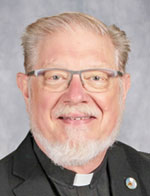That All May Be One / Fr. Rick Ginther
Irvington churches use October celebration to connect in faith
 Boo! Trick or treat! They are common, gleeful greetings this time of year for children and adults.
Boo! Trick or treat! They are common, gleeful greetings this time of year for children and adults.
I live in Irvington, founded in 1870 and an original suburb of Indianapolis. This historic district is named for Washington Irving, the author of “The Legend of Sleepy Hollow” and “Rip Van Winkle.”
The “Sleepy Hollow” connection spawned a lavish annual Irvington Halloween Festival, now in its 77th year. In Irvington, October is somewhat like May in Indy or April in New Albany!
Irvington has a strong Christian presence. We have a decades-old ministerial association. All our member churches are in some way connected to the Halloween festival.
Amid the ghost tours, decorations, stories of hauntings and Black Hat Society, among other things, some wonder if it is appropriate for Christians to participate.
The origins and customs of Halloween are many, flowing through centuries from varied nations and cultures.
The Christian focus is rooted in the feast of All Saints, or All Hallows. A vigil of fasting, abstinence and prayer developed to prepare the faithful for the feast. This “eve” (read “evening”) became All Hallows Eve(ning).
Later, the third day for commemoration of those deceased who are yet to enter the presence of God was added, known as All Souls Day.
But what brought about ghouls, goblins and candle lantern pumpkins or gourds carved to resemble people’s faces? They focus on death.
The month of November for Celtic and Germanic cultures marked the beginning of winter. The waning of light and warmth elicited a focus on the reality of death, even martyrdom. Bonfires, candles on graves, even processions (begun in Finland) cast aside the darkness and cold.
About the time that Irvington was founded, Irish, Scottish and German immigrants poured into the United States. They brought their All Hallows customs with them. These spread rather quickly.
By the mid-20th century, Halloween had spread from the Americas to many other countries throughout the world.
In our time, Orthodox Jews do not participate due to scriptural prohibitions, found in Leviticus 18:3, which forbids Jews from partaking in gentile customs. The more traditional practitioners of Islam will not participate due to the Christian origins.
Some Hindus choose to participate in the popular customs of Halloween. Others prefer to celebrate Pitru Paksha in September or Diwali (festival of lights) in November.
Some Christians resist participating in Halloween. Their concern: the “Catholic origin,” especially the connection to “purgatory” (thought to be “popish”) and the over-emphasis on the saints.
Some Christian resistance is also found in the purported Celtic pagan origin. The quarter day, Samhain, also falls on Nov. 1. It was the end of the harvest, the beginning of the darker half of the year. It was believed that at this time the “otherworld” thinned to allow for easier contact with the spirit world. Such are not compatible with their Christian beliefs.
Many Christians do participate publicly, including the churches in Irvington. Others confine their celebration to a modified form, gathering at their church in a family-oriented celebration of costumes, candy and treats.
Parishes and schools across the archdiocese have emphasized the Catholic roots of Halloween by having All Saints Day gatherings where children are invited to dress up as their favorite saints.
Reformed Jews and some Muslims may participate. “Secular” Halloween is not incompatible with their religious life.
The Irvington Association of Ministers encourages its parishioners to participate in the Halloween festival as they are comfortable.
The Irvington churches host a Spooky Organ Concert and a Halloween Health Fair. Our Lady of Lourdes Parish’s booths are nestled among the other booths on the Saturday before All Saints Day. We consider it a time of soft evangelization and connectivity. We join our community for some fun, good food and neighborly mingling.
On Sunday, we are back in our churches, ready to celebrate the wonder of the paschal mystery—and how it has touched those who have gone before us in faith and are now at rest in the Lord.
(Father Rick Ginther is director of the archdiocesan Office of Ecumenism and Interreligious Affairs. He is also the pastor of Our Lady of Lourdes Parish in Indianapolis.) †
 Boo! Trick or treat! They are common, gleeful greetings this time of year for children and adults.
Boo! Trick or treat! They are common, gleeful greetings this time of year for children and adults.